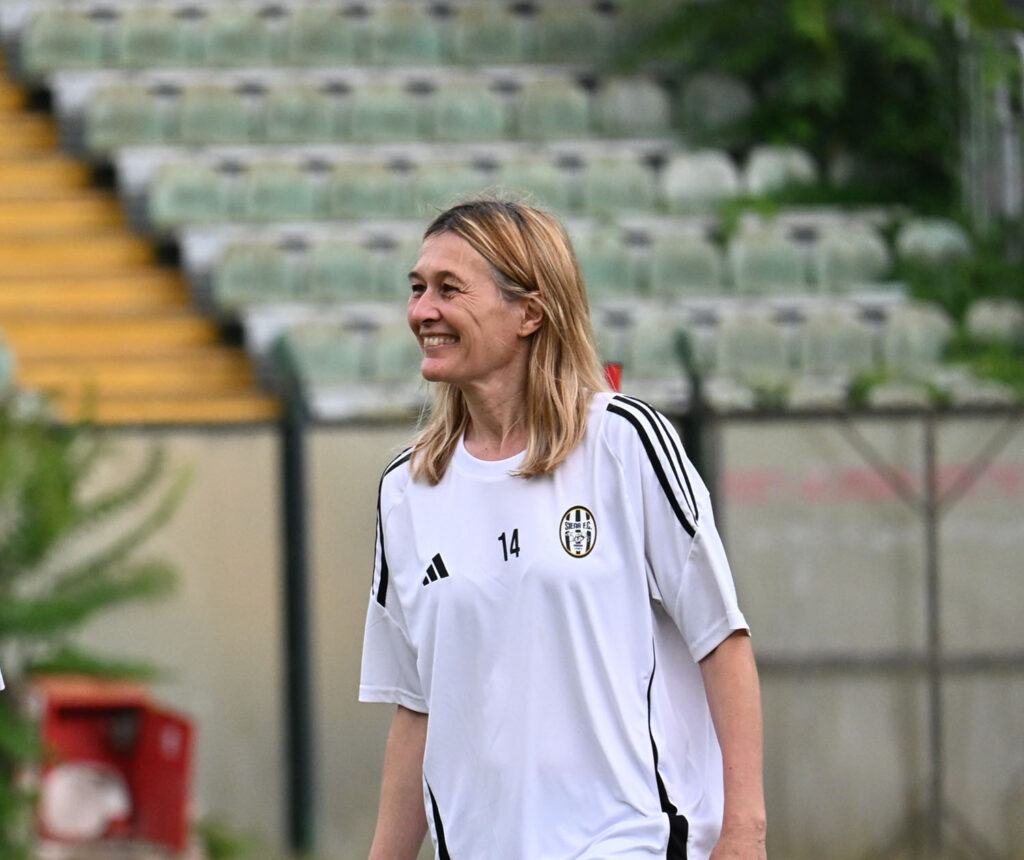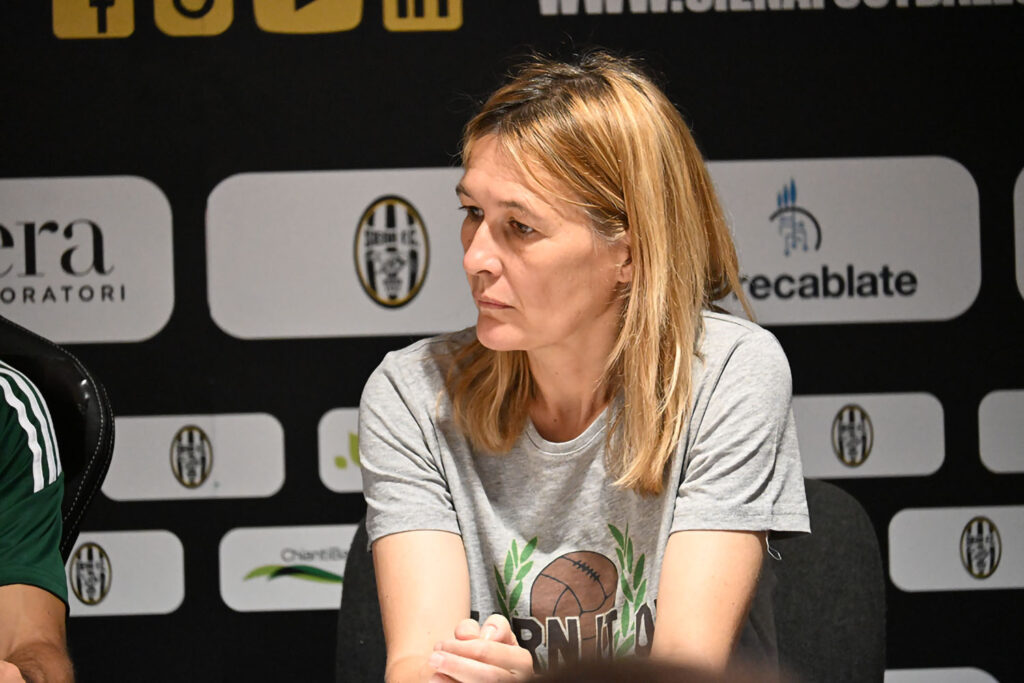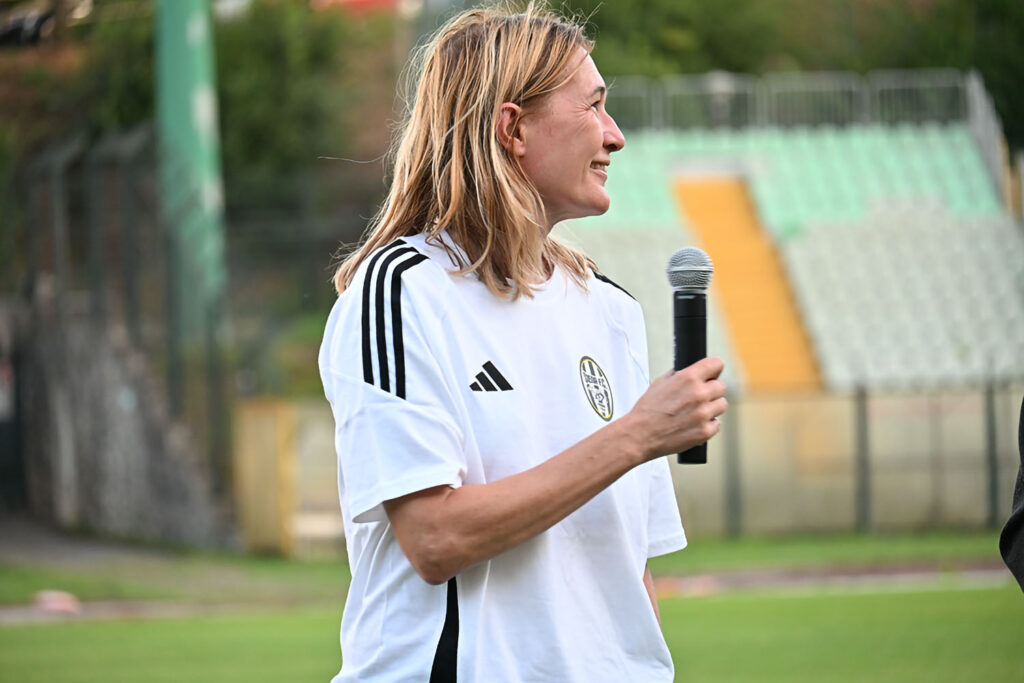
When Elena Proserpio Marchetti first introduced herself to the press and the city in the conference room of the Artemio Franchi Stadium, she expressed how happy she was to be in Siena. She chose three words to describe what had convinced her to accept the offer from the Bianconeri club: “culture, knowledge, and tradition'” “Then there’s the game level,” she added, “and that will be my job.” After the press conference, she went down to the pitch and I watched her as she began moving among the girls of her future team. She fit the role perfectly, interacting with the players with the confidence of someone who knows this job very well, but also with great humor and careful attention to her words. I remember deciding, in that moment, that I wanted to explore all those impressions more deeply in the interview we were planning to do. We eventually did that interview on the black and white seats of the covered stand, just before a training session of the women’s team. Throughout the conversation, Elena kept looking at the stadium, the buildings rising behind the stands, and then at San Domenico – as one looks at things long awaited.
I asked her to start by telling me about the path that brought her to Siena. “I started coaching in Milan,” she told me, “then I went to work in Costa Smeralda, where I managed a sports center with football and tennis fields. I had organized a five-a-side tournament there, and the girls from Olbia team came to play. I bonded with them a lot, and the club president told me they were looking for a coach and wanted me to stay. I accepted right away, and it turned out to be a wonderful year; it was 2010.” “Had your playing career ended by then?” I asked. “My career as a player was a bit… let’s say, patchy. I started and stopped several times: once as a child, because I got sick, but the love for football was so strong that I went back to playing. Then I quit again because I had decided I wanted to travel and study. You know, at the time it was really hard for a woman to make a living from football. The smartest or the most talented ones managed, and maybe I wasn’t either. But when I think about it, even those who did get paid well eventually moved on to other jobs – many of them earned degrees. Fortunately, today girls can live off football without necessarily needing to pursue parallel careers – although I still hope they choose to study anyway. So, I decided to study and travel, and I started doing all sorts of jobs around the world: I worked as a waitress, a scuba diving instructor, a translator, and an Italian teacher in Berlin.” “What was your goal?” I asked. “Simply to learn. Knowledge is the word I love the most.”

Returning to her travels, Elena told me that after Olbia she ended up in Livorno, “simply because the ferry route was Olbia–Livorno, and I remember saying: I’ll stop here. I had decided to take advantage of my degree in Art History to work as a tour guide, but in the meantime, I found fertile ground to return to coaching – and I did, starting with the little kids at Livorno.” In Livorno, Elena coached many teams. She told me about “a team of little girls that we signed up for a boys’ championship. You can’t imagine the nasty words people said to us, but then we regularly won the matches. I also coached a team of African boys, many of whom had just arrived in Italy. One of them was Demba Thiam, who is now a goalkeeper for Monza.” “And then you coached the national team, right?” I asked. “Yes, I coached the youth national teams – U17, U19, and U23 – and I also had some appearances with the senior national team. Basically, most of the players who were at the recent European Championship, I’ve coached them all.” Elena mentioned the recent Women’s Euro, which had taken place just a few months ago, and I couldn’t help but ask her more about it. She explained that, in her view, this year’s Women’s Euro achieved two main goals: gaining major visibility and earning appreciation for the quality of the game itself. We talked a lot about this topic, especially about the constant comparisons – which Elena considers a typically Italian trait – between men’s and women’s football. “What Soncin said this year – that it wasn’t the Women’s European Championship, but rather the European Championship of women’s football – is something I absolutely agree with. It’s a message that I, along with many others, have long been promoting. The constant comparison is completely pointless, because it’s obvious that, due to hormonal reasons, a man will always run faster than a woman – but the technical skill – the specific gesture of football – has to be mastered, and it remains beautiful in and of itself. Technique, training, passion, enthusiasm – those elements are the same. Everything else is not.” I asked Elena if anything can be done to help spread a fairer narrative, and she replied that there’s always something we can do – that some things have already changed, but much more still needs to change.
"If you think back to yourself as a child, what were you like? How did you experience your love for football?" I asked her, trying to understand where her passion for the game and the strength she radiates on the field come from. "As a child, I was very frail, and the doctor told my mother I should do a sport like rhythmic gymnastics. So I started, but I always ended up using the ball not as an apparatus, but just to juggle it. I started playing football in a team quite late compared to today – at 13." I then asked whether her parents had been an obstacle or supported her choice. "My dad was thrilled because we used to play together. My mom was a bit of a hurdle – not out of narrow-mindedness, but simply because she was always worried about my health. As I said, I was very frail, so she’d make me wear wool sweaters until summer. To go play football, I came up with a trick: I’d put a T-shirt and shorts in a plastic bag, toss it off the balcony, then tell my mom I was just going out for a walk. I’d go down, grab the bag, change clothes, and join the other kids for football. At first, there was some distance, but as soon as they realized I was often better than them, they always wanted me on their team. Sometimes they’d ask me, ‘Why do you play football? Are you a boy?’ I didn’t understand. I’d answer, ‘I’m a girl who plays football – can’t you see?’ Later on, those kids grew up, and I met many of them again playing Walking Football – a sport I helped introduce for women in Italy. And even then, some of them said, ‘Wait, so women play walking football too?’ It makes me laugh, but it just shows the kind of cultural background we’re dealing with," she concluded. "Is that why you prefer to be called ‘coach’instead of ‘mister’?", "Yes, of course. I’m a coach – not a mister!"

At that point, I decided to bring the conversation back to Elena's career and move closer to the present. “How did you get in touch with Siena FC?” I asked. “They contacted me – I think because, among the many places I’ve worked, I also coached in Sweden. I believe they came across my profile, and one day I got a call from Jenny. We later met in person. She kept showing me slide after slide about their project, but at some point, I told her: close the laptop – because I can already see twice as much in your eyes as in what you’re showing me. I left that meeting with an incredible energy.” And so we came to the present day, to the new black-and-white squad that was recently introduced to the fans. “The girls are all very different,” Elena told me, “the chemistry will build over time. I’ll definitely rely on players with both football and life experience, like Giulia Ferrandi. For me, the human element is essential. From a sporting point of view, my goal is to win the league, because a club and a city like this deserve to be on bigger stages. I want us to play beautiful football – we really do have a good team, but I’m sure others will be strong too.” “On a personal level, I care deeply about human relationships – beyond just training and results.” I took the chance to tell Elena something I had noticed early on: her careful choice of words during training sessions. “Yes, I deliberately keep the language elevated on the pitch. It’s a conscious choice. To communicate, etymologically, means to put something in common – and I really believe in that. When I step onto the pitch, I try to share what I know with the people around me. There’s an exchange. I always tell them that when we play football, we need to feel love for what we’re doing – whether that comes through a bercio [yes, she literally says bercio, which is a Tuscan slang for yell] or through words of encouragement. I also try to listen to them a lot. Sure, it takes a bit more time, but in the end, it pays off.”
To conclude, I asked Elena if she knew Siena well. “Artistically, I can’t wait to explore it. It’s perfect for me, since I studied medieval art. Football-wise, I haven’t been here much. I played three matches in Siena with the Under-19 national team a few years ago. I don’t really know what to expect, but I immediately supported the club’s decision not to buy a Serie C or Serie B license. It can be done – it costs a lot – but many clubs go down that road.” I told her I agreed, and she asked if I had noticed the shirt she wore during her first press conference. I admitted I hadn’t and asked why. “It said ‘earn it on the pitch’.That’s what I want to do in Siena. It’s a real challenge, but that’s why I’m here,” she concluded.
After that interview, I stayed to watch the training session. On my way home, the image that stuck with me was of her, in the black-and-white jersey, smiling at her new players and giving instructions – her vowels closed like a true northerner, but using plenty of Tuscan expressions: I swear I heard her say dura asserpentata [very hard]. Behind her, as always, stood San Domenico: medieval art and football. It’s probably just coincidence, but sometimes things really do seem to fall into place perfectly.
Aurora Codogno